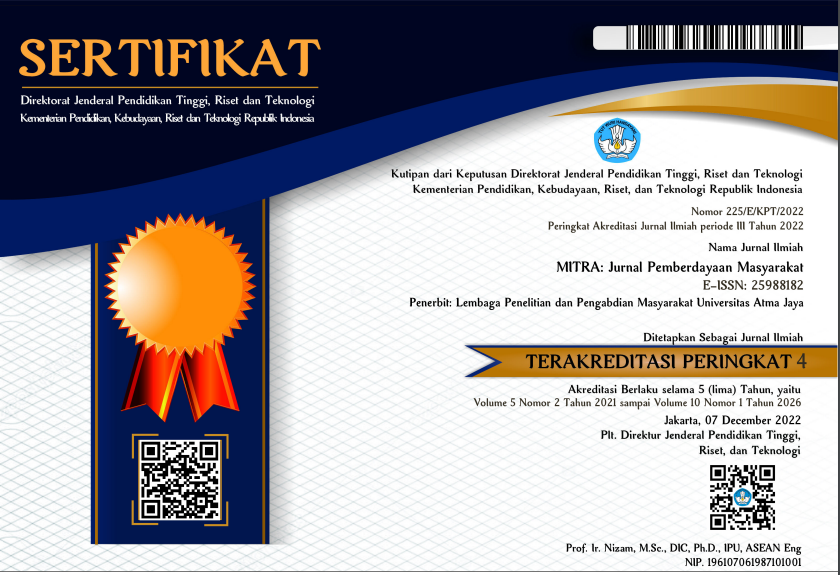Improving Nurse' Knowledge about Elder Abuse
DOI:
https://doi.org/10.25170/mitra.v6i2.3192Keywords:
health education, violence, elderlyAbstract
The incidence of violence in the elderly is suspected to have a very detrimental effect and can reduce the quality of life of the elderly. Several interventions, such as increasing public awareness and health workers, screening the risk of violence, and strengthening the elderly group to be able to report incidents of violence are known to have a positive effect on reducing cases of violence in the elderly. The activity was carried out in the form of increasing knowledge about violence in the elderly virtually for 464 participants consisting of nursing students and professional nurses from 23 provinces. The results of the Wilcoxon test analysis showed a significance value of 0.000 (< 0.05) which indicated a positive benefit in increasing nurses' knowledge about violence in the elderly. Health workers, especially nurses, are still one of the parties trusted by the elderly group to get rid of all the pain and treatment they experience. The implementation of knowledge improvement programs is known to have a positive effect on nurses' knowledge, some limitations that may be considered by researchers or health workers in designing further activities include: the need for full support from policy makers in implementing the program, the need for a program that is sustainable and not only carried out once in a while, and the need for an active role from health workers to participate in finding out about violence in the elderly through several other ways.
References
Bruele, A. B. Van Den, Dimachk, M., & Crandall, M. (2019). Elder abuse. Clinics in Geriatric Medicine, 35(1), 103–113. https://doi.org/10.1016/j.cger.2018.08.009
Cooper, C., & Livingston, G. (2016). Intervening to reduce elder abuse: Challenges for research. Age and Ageing, 45, 184–185. https://doi.org/10.1093/ageing/afw007
Corbi, G., Grattagliano, I., Sabbà, C., Fiore, G., Spina, S., Ferrara, N., & Campobasso, C. Pietro. (2019). Elder abuse : Perception and knowledge of the phenomenon by healthcare workers from two Italian hospitals. Internal and Emergency Medicine, 14, 549–555. https://doi.org/10.1007/s11739-019-02038-y
Dominguez, S. F., Ozguler, B., Storey, J. E., & Rogers, M. (2021). Elder abuse vulnerability and risk factors: Is financial abuse different from other subtypes? Journal of Applied Gerontology 1, 1–12. https://doi.org/10.1177/07334648211036402
Evans, C. S., Hunld, K. M., Rosen, T., & Platts-mills, T. F. (2017). Diagnosis of elder abuse in U.S. Emergency Departments. Journal of the American Geriatrics Society, 65(1), 91–97. https://doi.org/10.1111/jgs.14480
Han, S. D., & Mosqueda, L. (2020). Elder abuse in the covid-19 era. Journal of American Geriatrics Society, 1–2. https://doi.org/10.1111/jgs.16496
Joosten, M., Vrantsidis, F., & Dow, B. (2017). Understanding elder abuse: A scoping study (1st ed.). University of Melbourne and the National Ageing Research Institute.
Makaroun, L. K., Bachrach, R. L., & Rosland, A.-M. (2020). Elder abuse in the time of covid-19—Increased risks for older adults and their caregivers. American Journal of Geriatric Psychiatry, 28(8), 876–880. https://doi.org/10.1016/j.jagp.2020.05.017
Myhre, J., Saga, S., Malmedal, W., Ostaszkiewicz, J., & Nakrem, S. (2020). Elder abuse and neglect: An overlooked patient safety issue. A focus group study of nursing home leaders’ perceptions of elder abuse and neglect. BMC Health Services Research, 20(199), 1–14. https://doi.org/10.1186/s12913-020-5047-4 (2020)
Peraturan Presiden Republik Indonesia Nomor 88 Tahun 2021 tentang Strategi Nasional Kelanjutusiaan, Pub. L. No. Perpres Nomor 88 Tahun 2021.
Phelan, A. (2018). The role of the nurse in detecting elder abuse and neglect: Current perspectives. Nursing: Research and Reviews, 8, 15–22. https://doi.org/10.2147/NRR.S148936
Pradana, A. A. (2021). Demensia pada pasangan lansia (1st ed.). CV. Infermia Publishing.
Pradana, A. A. (2022a). Dementia : An overview. JMIR Publications, Preprints, 1–12. https://doi.org/10.2196/preprints.36300
Pradana, A. A. (2022b). Elder abuse : A review. JMIR Publications, Preprint, 1–12. https://doi.org/https://doi.org/10.2196/preprints.36664
Pradana, A. A. (2022c). Social capital as a determinant of health in older adults: A narrative review. KnE Life Sciences, 1, 1–11. https://doi.org/10.18502/kls.v7i2.10280
Pradana, A. A., Casman, & Nur’aini. (2020). Pengaruh kebijakan social distancing pada wabah covid-19 terhadap kelompok rentan di Indonesia. Jurnal Kebijakan Kesehatan Indonesia, 09(02), 61–67. https://doi.org/https://doi.org/10.22146/jkki.55575
Pradana, A. A., Sahar, J., & Permatasari, H. (2021). Health education for the elderly to prevent depression problems during a pandemic through android application. STRADA Jurnal Ilmiah Kesehatan, 10(1), 1380–1388. https://doi.org/10.30994/sjik.v10i1.699
Sasmito, M. (2020). Kasus penelantaran masih dialami lansia Indonesia. https://www.voaindonesia.com/a/kasus-penelantaran-masih-dialami-lansia-indonesia/5701737.html
Sathya, T., & Premkumar, R. (2020). Association of functional limitations and disability with elder abuse in India: A cross-sectional study. BMC Geriatrics, 20, 1–11. https://doi.org/10.1186/s12877-020-01619-3
Storey, J. E. (2019). Risk factors for elder abuse and neglect: A review of the literature. Aggression and Violent Behavior, 50, 101339. https://doi.org/10.1016/j.avb.2019.101339
Syarafina, F. Z., & Pradana, A. A. (2022). Community knowledge of elderly neglect: A literature review. Journal of Vocational Nursing, 3(1), 42–46. www.e-journal.unair.ac.id/JoViN
Szreter, S., & Woolcock, M. (2004). Health by association? Social capital, social theory, and the political economy of public health. International Journal of Epidemiology, 33(4), 650–667. https://doi.org/10.1093/ije/dyh013
The American Psychological Association. (2012). Elder abuse and neglect: In search of solutions. https://www.apa.org/pi/aging/resources/guides/elder-abuse
Yon, Y., Mikton, C., Gassoumis, Z. D., & Wilber, K. H. (2019). The prevalence of self-reported elder abuse among older women in community settings: A systematic review and meta-analysis. TRAUMA, VIOLENCE, & ABUSE, 20(2), 1–15. https://doi.org/10.1177/1524838017697308
Yon, Y., Mikton, C. R., Gassoumis, Z. D., & Wilber, K. H. (2017). Elder abuse prevalence in community settings: A systematic review and meta-analysis. The Lancet Global Health, 5(2), e147–e156. https://doi.org/10.1016/S2214-109X(17)30006-2
Yunus, R. M., Hairi, N. N., & Yuen, C. W. (2017). Consequences of elder abuse and neglect: A systematic review of observational studies. TRAUMA, VIOLENCE, & ABUSE, 20(2), 1–17. https://doi.org/10.1177/1524838017692798
Downloads
Published
Issue
Section
License
Copyright (c) 2022 Anung Ahadi Pradana, Rohayati Rohayati, Casman Casman

This work is licensed under a Creative Commons Attribution-NonCommercial-ShareAlike 4.0 International License.
This license allows reusers to distribute, remix, adapt, and build upon the material in any medium or format for noncommercial purposes only, and only so long as attribution is given to the creator. If you remix, adapt, or build upon the material, you must license the modified material under identical terms.



_.jpeg)

.png)
2.png)
.png)
.png)



